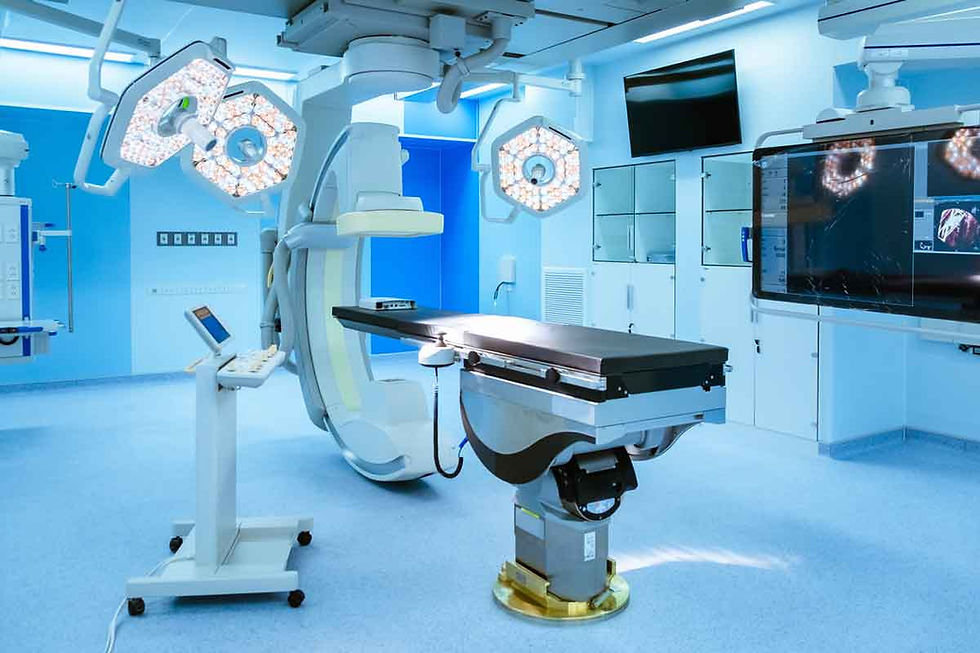Europe’s First Modular Cardiac EP Lab arrives in Oxford
- RPH News Editor
- Nov 28, 2022
- 3 min read
Regent’s Park Heart Clinics Ltd. (Regent’s Park), an independent healthcare company specialising in the diagnosis and treatment of heart disease, today announced it is providing modular cardiac electrophysiology (“EP”) and ablation services at The John Radcliffe Hospital in Oxford. The John Radcliffe is a major tertiary cardiothoracic teaching centre providing open-heart surgery and advanced cardiology with strong academic links with the medical sciences faculty of Oxford University.
Dr. Ohri, Chief Executive of Regent’s Park said: “We are extremely proud to have won this contract to build upon the existing cardiac rhythm management services available in Oxford using one of our specially equipped laboratories. We call them “SuperLabsTM “because of their huge size, state-of-the-art technology and their versatility. The Oxford SuperLabTM was designed, built, equipped and installed in just15 weeks at a cost of around £2 million. It is the largest and most advanced of its kind anywhere in the world, and was designed and equipped by our engineers to meet the specific requirements of EP cardiologists in Oxford.”
Dr. Ohri added: “The laboratory has been fitted with two state of the art EP & ablation systems, piped anaesthetic gases for providing general anaesthesia for more complex cases and is digitally networked into the main hospital system. It even has its own kitchen and image archiving room to reduce the need for staff to move to and from the main hospital.”
Dr. Tim Betts, Consultant Electrophysiologist, at the John Radcliffe commented: “It’s excellent – the laboratory feels and acts like the real thing and it has all the up to date equipment. It is purpose built with all the essential services tidied away in the floor and ceiling.”
Ruth Titchener, Head Cardiac Nurse, at the John Radcliffe said: “Since this service commenced, we have been able to introduce transfers from local hospitals on a day case basis where before they had to wait for a bed in cardiology. Patients would wait for a month, now it is five days”.
“By shifting all of the EP workload into the SuperLabTM from the main catheter labs in the hospital, operational workflows become more streamlined, providing the main catheter labs with more capacity to perform diagnostic and interventional cardiology. We believe this type of operations model, by removing competing pressures for catheter laboratory space, is a win-win situation for everyone,” commented Andrew White, Superintendent Radiographer, at Regent’s Park.
EP and ablation services are one of the fastest growing sub-specialties within interventional cardiology, with an estimated 700,000 people in the UK suffering from some form of cardiac rhythm problem the demand to perform more interventions has never been greater. There are only around 65 cardiologists based in about 40 hospitals in the UK1 trained to do these type of procedures compared to around 2,400 cardiologists in over 650 hospitals in the USA2 – approximately 8 times as many cardiologists per capita of the population. Staffing as well as other resources constraints are set to be recognised by the Department of Health in a new Arrhythmias chapter in the National Service Framework for Coronary Heart Disease due to be published in March 2005.
Dr. Ohri of Regent’s Park added: “We have long recognised that UK rhythm management services need to be rapidly expanded if we are to provide patients with accessible and high quality standards of care. We believe this type of dedicated laboratory service model, which has been re-designed to meet the needs of both doctors and patients, will help to concentrate expertise and so achieve economies of scale, high volumes and good results.”
“Arrhythmias encompass a broad spectrum, from benign tachycardias that are not life threatening but do cause disabling symptoms, to dangerous, life-threatening tachycardias that are a leading cause of sudden cardiac death in the developed world. Over the last decade, huge advances in knowledge and technology now enable electrophysiologists to prevent or cure the vast majority of arrhythmias, as well as providing sophisticated device therapies for heart failure patients. This has resulted in an exponential growth of patients who could now benefit from treatment. To meet this need, we require the equipment and resources that a modern, state-of-the art facility such as the SuperLab can provide,” said Dr. Tim Betts.
Regent’s Park is an independent company dedicated to creating world-class centres for the diagnosis and treatment of heart disease. The company develops, owns and operates diagnostic and treatment facilities focusing exclusively on cardiovascular disease in partnership with leading hospitals and groups of cardiologists across the United Kingdom. Regent’s Park has been a national provider of cardiology services to the NHS since 2003, and has provided invasive cardiology procedures to over 4,000 patients through its facilities – coronary angiograms, coronary angioplasty, cardiac electrophysiology, defibrillator and pacing procedures. Regent’s Park prides itself on its ability to deliver high quality, cost effective cardiac care, through excellent service, efficient operations management, well trained staff, and uncompromising professionalism.
The Regent’s Park guiding philosophy is that every patient with heart disease should have access to healthcare of a world-class standard.




Comments